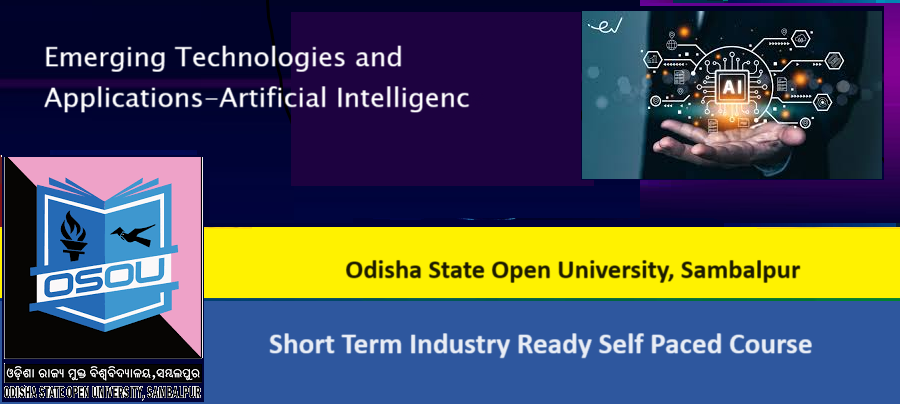

Note: Please check your Spam or Junk folder, in case you didn't receive the email with verification code.
Linear: Sequential Order
Course code: CAI-01
Course Name: Emerging Technologies and Applications-Artificial Intelligence (CAI-01)
INSTRUCTIONAL DESIGN
The university offers Online Self-paced Learning courses of about 60 hours with 4 credits each. These courses are designed to provide a comprehensive and engaging learning experience, adopting of (4) Four-Quadrant Approach i.e., eContent, eTutorials, Self-Assessments and Discussion Board.
METHODOLOGY
To ensure effective understanding, knowledge retention and practical applications, these courses use the following methodology:
1. Self-paced online course delivered with four-quadrant approach
2. Unit-wise Structured Course with
3. Modular MCQ-based Self-Assessments
4. Assignments for Practical Applications
5. 24x7 Online Community Support from Peers and Faculty
6. Periodic Live Interactive Sessions by Industry Professionals
7. Flexible Course Duration with a minimum of 1 month to a maximum of 1 year.
8. Final Examination (3 hours) after completing 60 hours of learning
a. Early Examination in limited centres near Regional Centres (RCs)
b. Regular Examination twice a year (Semester Pattern) near the students’ location.
NOTE: Not more than 4 (Four) Self-paced Online Courses can be taken concurrently.
Course Objectives
1. Understand the fundamental concepts and theories of Artificial Intelligence (AI)
2. Develop knowledge of various AI techniques and algorithms
3. Learn to apply AI methods to solve real-world problems
4. Understand the ethical implications and societal impact of AI
5. Gain practical experience in implementing AI systems
6. Develop critical thinking skills for evaluating AI solutions
Course Outcomes
By the end of this course, students will be able to:
1. Explain core AI concepts and their applications in various domains
2. Implement basic AI algorithms for problem-solving and decision-making
3. Design and develop intelligent agents using appropriate AI techniques
4. Apply machine learning algorithms to analyze and interpret data
5. Understand and implement basic natural language processing techniques
6. Evaluate the performance and limitations of AI systems
7. Discuss ethical considerations and potential societal impacts of AI
8. Demonstrate familiarity with current trends and future directions in AI research
9. Implement basic computer vision and image processing techniques
10. Apply AI concepts to develop simple game-playing algorithms
.
 Definition and history of AI
Definition and history of AI
 Types of AI narrow general AI
Types of AI narrow general AI
 AI applications and impact on various industries
AI applications and impact on various industries
 E-Tutorial 1
Duration:
E-Tutorial 1
Duration:
 E-Tutorial 2
Duration:
E-Tutorial 2
Duration:
 Assessment
5 Questions
Assessment
5 Questions
 Agent architectures
Agent architectures
 Search algorithms Uninformed and informed search
Search algorithms Uninformed and informed search
 Constraint satisfaction problems
Constraint satisfaction problems
 E-Tutorial 1
Duration:
E-Tutorial 1
Duration:
 E-Tutorial 2
Duration:
E-Tutorial 2
Duration:
 Assessment
5 Questions
Assessment
5 Questions
 Propositional and first-order logic
Propositional and first-order logic
 Inference and theorem proving
Inference and theorem proving
 Probabilistic reasoning and Bayesian networks
Probabilistic reasoning and Bayesian networks
 E-Tutorial 1
Duration:
E-Tutorial 1
Duration:
 E-Tutorial 2
Duration:
E-Tutorial 2
Duration:
 Assessment
5 Questions
Assessment
5 Questions
 Supervised learning classification and regression
Supervised learning classification and regression
 Unsupervised learning clustering and dimensionality reduction
Unsupervised learning clustering and dimensionality reduction
 Reinforcement learning basics
Reinforcement learning basics
 Evaluation metrics and model selection
Evaluation metrics and model selection
 E-Tutorial 1
Duration:
E-Tutorial 1
Duration:
 E-Tutorial 2
Duration:
E-Tutorial 2
Duration:
 Assessment
5 Questions
Assessment
5 Questions
 Perceptrons and multilayer networks
Perceptrons and multilayer networks
 Backpropagation and optimization algorithms
Backpropagation and optimization algorithms
 Convolutional Neural Networks (CNNs)
Convolutional Neural Networks (CNNs)
 Recurrent Neural Networks (RNNs) and LSTMs
Recurrent Neural Networks (RNNs) and LSTMs
 E-Tutorial 1
Duration:
E-Tutorial 1
Duration:
 E-Tutorial 2
Duration:
E-Tutorial 2
Duration:
 Assessment
5 Questions
Assessment
5 Questions
 Text preprocessing and feature extraction
Text preprocessing and feature extraction
 Syntax and parsing
Syntax and parsing
 Sentiment analysis and text classification
Sentiment analysis and text classification
 Introduction to language models and transformers
Introduction to language models and transformers
 E-Tutorial 1
Duration:
E-Tutorial 1
Duration:
 E-Tutorial 2
Duration:
E-Tutorial 2
Duration:
 Assessment
5 Questions
Assessment
5 Questions
 Image processing fundamentals
Image processing fundamentals
 Object detection and recognition
Object detection and recognition
 Face recognition
Face recognition
 Image segmentation
Image segmentation
 E-Tutorial 1
Duration:
E-Tutorial 1
Duration:
 E-Tutorial 2
Duration:
E-Tutorial 2
Duration:
 Assessment
5 Questions
Assessment
5 Questions
 Robot kinematics and dynamics
Robot kinematics and dynamics
 Simultaneous Localization and Mapping (SLAM)
Simultaneous Localization and Mapping (SLAM)
 Path planning and navigation
Path planning and navigation
 E-Tutorial 1
Duration:
E-Tutorial 1
Duration:
 Assessment
5 Questions
Assessment
5 Questions
 Rule-based systems
Rule-based systems
 Fuzzy logic
Fuzzy logic
 Ontologies and semantic networks
Ontologies and semantic networks
 Assessment
5 Questions
Assessment
5 Questions
 Preparing operating budgets
Preparing operating budgets
 Cash budgets
Cash budgets
 Flexible budgets
Flexible budgets
 Forecasting techniques
Forecasting techniques
 E-Tutorial 1
Duration:
E-Tutorial 1
Duration:
 E-Tutorial 1
Duration:
E-Tutorial 1
Duration:
 Assessment
5 Questions
Assessment
5 Questions
 Minimax algorithm
Minimax algorithm
 Alpha-beta pruning
Alpha-beta pruning
 Monte Carlo Tree Search
Monte Carlo Tree Search
 E-Tutorial 1
Duration:
E-Tutorial 1
Duration:
 E-Tutorial 2
Duration:
E-Tutorial 2
Duration:
 Assessment
5 Questions
Assessment
5 Questions
 Bias and fairness in AI systems
Bias and fairness in AI systems
 Privacy concerns and data protection
Privacy concerns and data protection
 AI governance and regulation
AI governance and regulation
 AIs impact on employment and society
AIs impact on employment and society
 Assessment
5 Questions
Assessment
5 Questions
 Explainable AI
Explainable AI
 AI in edge computing and IoT
AI in edge computing and IoT
 Artificial General Intelligence (AGI) concepts
Artificial General Intelligence (AGI) concepts
 E-Tutorial 1
Duration:
E-Tutorial 1
Duration:
 E-Tutorial 2
Duration:
E-Tutorial 2
Duration:
 Quantum computing for AI
Quantum computing for AI
 Assessment
5 Questions
Assessment
5 Questions
 AI project lifecycle
AI project lifecycle
 Data collection and preprocessing
Data collection and preprocessing
 Model deployment and maintenance
Model deployment and maintenance
 AI development tools and frameworks
AI development tools and frameworks
 E-Tutorial 1
Duration:
E-Tutorial 1
Duration:
 Assessment
5 Questions
Assessment
5 Questions
 Final Assessment
50 Questions
Final Assessment
50 Questions
The certificate issued for the Course will have
Only the e-certificate will be made available. No Hard copies. The certificates issued by Odisha State Open University, Sambalpur. can be e-verifiable at www.ulektzskills.com/verify.



 60 hours Learning Content
60 hours Learning Content 100% online Courses
100% online Courses English Language
English Language Certifications
Certifications